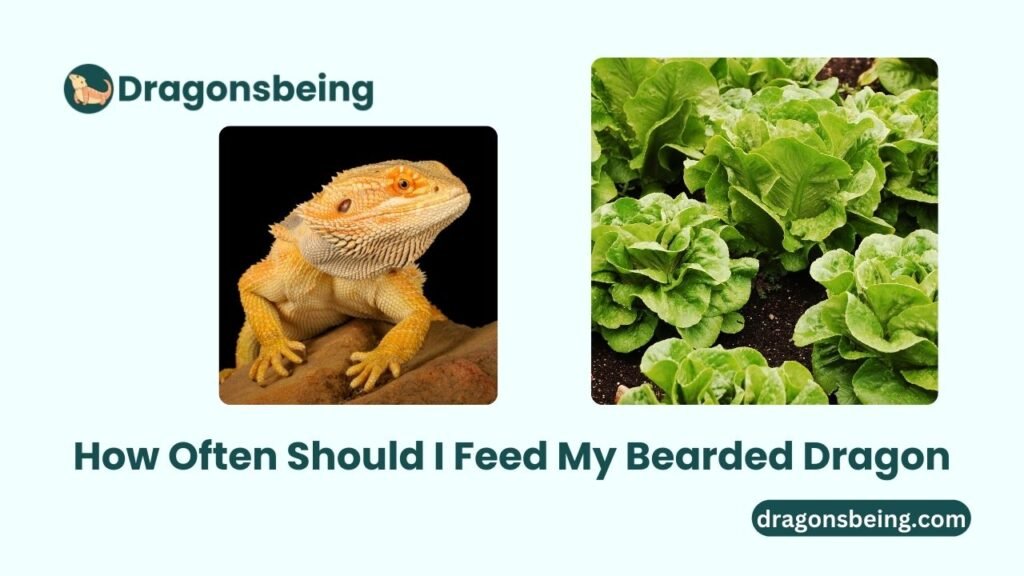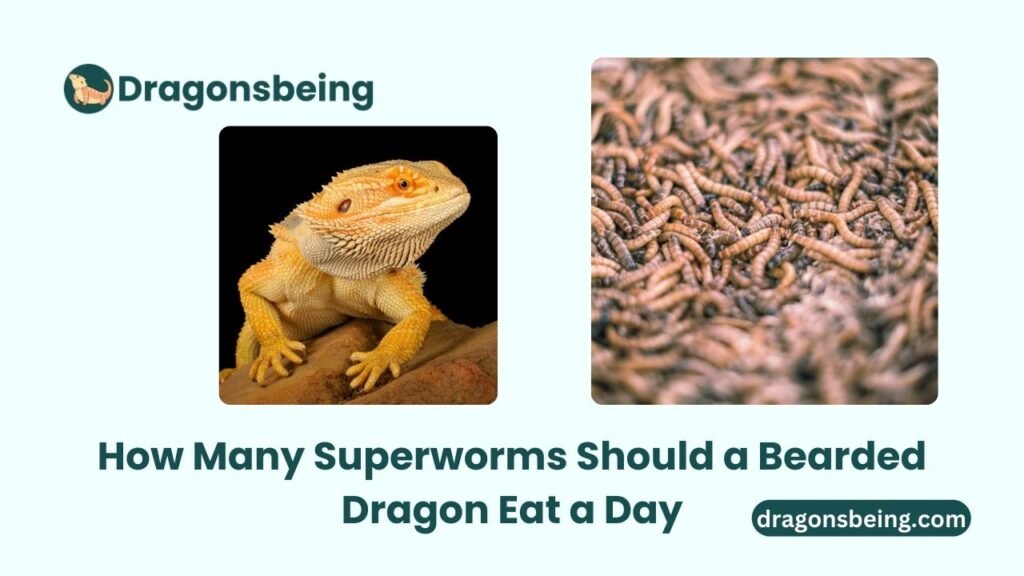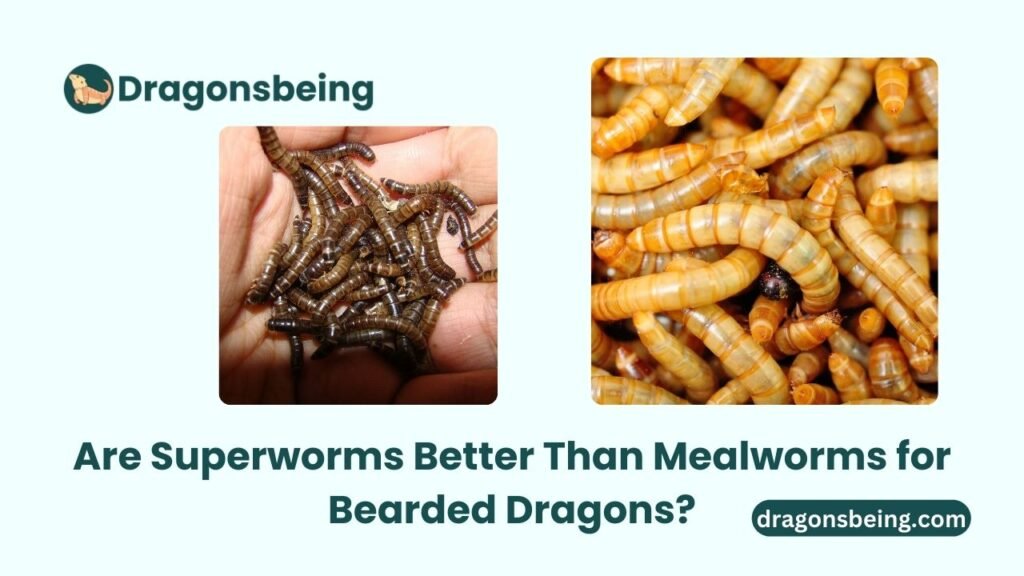Feed your bearded dragon daily if it’s a juvenile. Adults should be feed every other day.
Bearded dragons are popular pets known for their friendly nature and unique dietary needs.
Understanding how often to feed them is crucial for their health and well-being.
Juvenile bearded dragons require more frequent meals to support their rapid growth.
Adults, on the other hand, have slower metabolisms and can thrive on less frequent feeding.
A balanced diet, including insects and vegetables, plays a vital role in their development.
This guide will help you determine the best feeding schedule for your bearded dragon, ensuring it remains healthy and happy throughout its life.
Proper nutrition is key to a long and fulfilling life for your pet.
Feeding Frequency For Juveniles
For juvenile bearded dragons, feeding frequency is crucial for their growth and health.
Juveniles typically range from 2 to 7 months old, and during this stage, their diet should be rich in protein to support rapid growth.
Here’s a guideline for feeding frequency:
1. Insects (Protein Source)
- Frequency: 2-3 times per day.
- What to Feed: Feeder insects such as crickets, dubia roaches, and small worms (e.g., mealworms and superworms in moderation).
- Amount: Let them eat as many insects as they can in a 10-15 minute period for each feeding session.
- Important Note: Ensure the insects are smaller than the space between the bearded dragon’s eyes to prevent choking.
2. Vegetables and Greens
- Frequency: Offer fresh greens every day.
- What to Feed: Leafy greens (like collard greens, mustard greens, and dandelion greens), and a small variety of vegetables such as squash and bell peppers.
- Important Note: While protein is the primary focus, juveniles should still be exposed to vegetables to develop healthy eating habits for adulthood.
3. Fruits (Treats)
- Frequency: Once or twice per week.
- What to Feed: Berries, apples (without seeds), and melons in small quantities.
- Important Note: Fruits should be given sparingly as treats due to high sugar content.
Additional Tips:
- Calcium and Vitamin D3: Dust feeder insects with calcium powder (with D3) at least 4-5 times a week to prevent metabolic bone disease.
- Hydration: Ensure they have access to fresh water daily and mist them if they aren’t drinking enough.
Feeding Frequency For Adult Bearded
When it comes to the feeding frequency for adult bearded dragons, their diet and schedule should be well-balanced to ensure they stay healthy. Here’s a general guideline for feeding adult bearded dragons:
1. Insects and Protein Sources (2-3 times a week):
- Adult bearded dragons typically need fewer insects than juveniles, as they should transition to a more plant-based diet.
- Offer protein sources like crickets, mealworms, superworms, or dubia roaches 2-3 times a week.
- It’s important to limit the amount of protein to avoid obesity in adult dragons.
2. Vegetables and Greens (Daily):
- Fresh vegetables and leafy greens should make up the bulk of their daily diet.
- Safe options include mustard greens, collard greens, dandelion greens, squash, and bell peppers.
- Offer a variety of greens and veggies daily, and ensure they are finely chopped.
3. Fruits (Occasionally):
- Fruits should only be given as occasional treats, about once or twice a week.
- Suitable fruits include apples, blueberries, strawberries, and papayas, but they should be given in moderation due to their sugar content.
4. Supplements:
- Dust their food with calcium powder 2-3 times per week, and a multivitamin powder once a week.
By following this feeding frequency, your adult bearded dragon will receive a well-rounded diet that supports their health. It’s important to adjust based on the individual dragon’s health, activity levels, and preferences.
The Role Of Live Prey In Diet
Live prey plays a vital role in a bearded dragon’s diet.
It provides essential nutrients, promotes natural hunting behavior, and keeps your pet active. Insects are a primary food source, offering protein and hydration.
Types Of Insects And Frequency
Bearded dragons thrive on various insects. Here’s a list of suitable insects:
- Crickets: High in protein, ideal for young dragons.
- Mealworms: Good for older dragons, but moderate in fat.
- Dubia Roaches: Excellent source of protein and low in fat.
- Superworms: High in calories, offer in moderation.
- Waxworms: Treats for their sweetness, limit their intake.
Frequency of feeding varies by age:
| Age | Feeding Frequency |
|---|---|
| Hatchlings (0-3 months) | 3-4 times per day |
| Juveniles (3-6 months) | 2-3 times per day |
| Adults (6+ months) | 1 time per day |
Live Feeding Best Practices
Feeding live insects requires care. Follow these best practices:
- Gut-load insects: Feed insects nutritious foods 24 hours before feeding them to your dragon.
- Dust with supplements: Use calcium and vitamin powders to enhance nutrition.
- Offer the right size: Choose insects smaller than the width of your dragon’s head.
- Remove uneaten insects: Prevent stress and maintain a clean habitat.
- Monitor feeding: Observe your dragon’s eating habits and adjust accordingly.
Vegetables And Fruits: Balancing The Diet
Bearded dragons need a balanced diet for good health. Vegetables and fruits provide essential nutrients. They are a crucial part of their diet. Finding the right balance is key.
Safe Plant-based Foods For Bearded Dragons
Choosing safe foods is important for your bearded dragon. Here are some safe vegetables and fruits to consider:
| Vegetables | Fruits |
|---|---|
| Collard Greens | Strawberries |
| Kale | Blueberries |
| Mustard Greens | Raspberries |
| Bell Peppers | Mango (in moderation) |
| Carrots (grated) | Peaches (pitted) |
These foods are safe and nutritious. Always wash them before feeding. Cut them into small pieces for easy consumption.
How Often To Offer Greens
Bearded dragons should have greens daily. Offer a variety to keep them interested. Aim for the following feeding schedule:
- Young Bearded Dragons: 80% insects, 20% greens daily.
- Adult Bearded Dragons: 20% insects, 80% greens every other day.
Monitor their preferences. Adjust the diet based on what they enjoy. This keeps them healthy and happy.
Supplements And Vitamins: Ensuring Complete Nutrition
Bearded dragons need a balanced diet to thrive. Supplements and vitamins fill gaps in their nutrition. They help prevent health issues. Proper supplementation enhances your dragon’s growth and vitality. Always choose high-quality products.
Calcium And Vitamin D3 Supplements
Calcium is crucial for strong bones. Bearded dragons often lack calcium from their diet. Vitamin D3 helps absorb calcium effectively. Without it, your dragon can suffer from metabolic bone disease.
- Use calcium powder for dusting insects.
- Choose a calcium supplement with D3.
- Consider calcium-rich foods like collard greens.
Frequency Of Supplementation
Regular supplementation is vital. Follow this schedule for best results:
| Age Group | Calcium Supplementation | Vitamin D3 Supplementation |
|---|---|---|
| Hatchlings (0-3 months) | 5 times a week | 2 times a month |
| Juveniles (3-12 months) | 4 times a week | 2 times a month |
| Adults (1 year+) | 2 times a week | 1 time a month |
Adjust the frequency based on your dragon’s needs. Monitor their health regularly. Consult a vet for personalized advice.
Water Intake And Hydration
Proper hydration is vital for your bearded dragon’s health. Water intake supports digestion, regulates body temperature, and maintains energy levels. Understanding how to provide water is essential for your pet’s well-being.
Providing Water To Bearded Dragons
Bearded dragons need fresh water daily. Here are some effective ways to ensure they stay hydrated:
- Provide a shallow water dish.
- Change the water daily to keep it fresh.
- Use a spray bottle to mist your dragon occasionally.
- Offer water-rich vegetables like cucumbers and lettuce.
Always ensure the water is at room temperature. Avoid ice-cold water to prevent shock.
Signs Of Dehydration
Recognizing dehydration is crucial. Watch for these signs:
- Sunken eyes
- Dry skin
- Lethargy
- Loss of appetite
Check skin elasticity by gently pinching the skin. If it doesn’t bounce back quickly, your dragon may be dehydrated.
| Signs | What to Do |
|---|---|
| Sunken eyes | Increase water supply |
| Dry skin | Mist with water |
| Lethargy | Consult a vet |
| Loss of appetite | Check for hydration |
Keeping your bearded dragon hydrated ensures a happy and healthy life.
Understanding Weight And Health
Maintaining your bearded dragon’s weight is essential for its health. A healthy weight ensures your pet thrives. It influences energy levels, mood, and overall well-being. Regular monitoring helps prevent health issues.
Monitoring Your Bearded Dragon’s Weight
Weigh your bearded dragon regularly. Use a digital scale for accuracy. Track the weight weekly or bi-weekly. Note any significant changes. Here are some tips for monitoring:
- Weigh at the same time each week.
- Keep a weight log for reference.
- Look for signs of weight loss or gain.
A healthy bearded dragon should feel firm yet not bony. Feel the spine and ribs gently. A healthy dragon should have a slight layer of fat.
Adjusting Diet Based On Health And Activity Level
Diet changes based on your dragon’s health and activity. Active dragons need more food. Less active dragons require fewer calories. Observe your dragon’s behavior:
- Eating habits: Is your dragon eating well?
- Energy levels: Is it active or lethargic?
- Physical appearance: Is it too thin or too chubby?
Adjust the diet accordingly:
| Activity Level | Recommended Diet |
|---|---|
| High | More insects and greens |
| Moderate | Balanced diet of insects and greens |
| Low | Fewer insects, increase greens |
Regularly assess and modify your dragon’s diet. This ensures optimal health and weight management.
Common Feeding Mistakes To Avoid
Feeding your bearded dragon properly is crucial for its health. Many owners make mistakes that can harm their pet. Understanding these common errors can help you provide the best care.
Overfeeding And Obesity Risks
Overfeeding is a common mistake. It can lead to obesity and health problems. Bearded dragons need a balanced diet, not excess food.
- Adult bearded dragons eat every other day.
- Young bearded dragons need daily meals.
- Use a variety of foods to maintain interest.
Here are signs of obesity:
- Difficulty moving.
- Visible fat pads.
- Unhealthy shedding.
To avoid overfeeding:
- Measure food portions.
- Follow feeding schedules.
- Monitor weight regularly.
Dangerous Foods To Exclude
Some foods are harmful to bearded dragons. Avoid giving them these dangerous items:
| Food Item | Reason to Avoid |
|---|---|
| Avocado | Toxic to reptiles |
| Iceberg Lettuce | Low nutritional value |
| Citrus Fruits | Can cause stomach upset |
| Onions | Harmful to red blood cells |
Always research new foods. Ensure they are safe before feeding. Healthy choices lead to a happier bearded dragon.
Faqs On Feeding Bearded Dragons
Understanding how often to feed your bearded dragon is crucial. Many owners have questions about their pet’s eating habits. Here are some common FAQs to help you.
Handling Irregular Eating Habits
Bearded dragons can have irregular eating habits. Various factors can affect their appetite. Here are some reasons why your dragon might not eat:
- Stress: Changes in environment can cause stress.
- Illness: A sick dragon will eat less.
- Age: Younger dragons eat more than adults.
- Temperature: Incorrect temperatures can reduce appetite.
Monitor your dragon’s behavior closely. If the irregular eating continues, consult a vet. Regularly check their habitat for comfort and safety.
What To Do During Brumation
Brumation is a natural process for bearded dragons. During this time, their metabolism slows down. They may eat less or stop eating altogether. Here’s how to manage their feeding during brumation:
| Action | Description |
|---|---|
| Reduce Feeding | Cut down on food intake during brumation. |
| Monitor Weight | Check their weight regularly to ensure health. |
| Provide Water | Always ensure fresh water is available. |
| Consult a Vet | Seek advice if they stop eating for too long. |
Brumation can last several weeks to months. Be patient and provide a safe space. Your dragon will come back to eating when ready.
Frequently Asked Questions
How Many Times A Day Should I Feed My Bearded Dragon?
Feed your bearded dragon once or twice daily, depending on age and appetite.
What Foods Are Best For Bearded Dragons?
Offer a mix of leafy greens, vegetables, and protein sources like insects for balanced nutrition.
Can I Overfeed My Bearded Dragon?
Yes, overfeeding can lead to obesity and health issues. Monitor portion sizes closely.
Should I Give My Bearded Dragon Treats?
Limit treats to occasional offerings to maintain a healthy diet and prevent obesity.
How Do I Know If My Bearded Dragon Is Hungry?
Look for signs like active behavior, searching for food, or weight loss.
Is It Safe To Skip A Feeding?
Occasionally skipping a feeding is fine, especially if your bearded dragon is an adult and healthy. “`
Conclusion
Feeding your bearded dragon the right amount is crucial for its health. Regularly assess your pet’s needs as they grow. Young dragons require more frequent meals than adults. Always focus on a balanced diet of insects and vegetables. Proper care ensures your bearded dragon thrives and enjoys a long, happy life.

Hi, I’m Dr. Michelle Mayers, a veterinary professional with a deep passion for animal health and well-being. Over the years, I’ve dedicated my life to caring for animals and helping pet owners better understand their furry, feathered, or scaly companions. On my blog, Dragonsbeing, I share insights, tips, and stories that aim to educate, inspire, and connect with fellow animal lovers. Join me at Dragonsbeing as we explore the fascinating world of veterinary care and celebrate the special bond between humans and animals!


